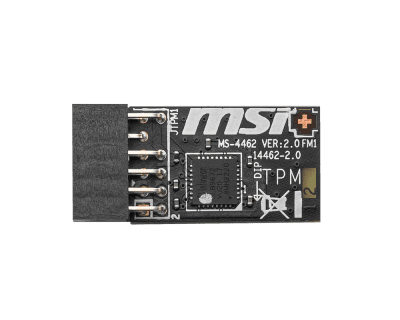I've learned some things about TPM modules that you may want to know if you need to go shopping for one.
1) There is NOT a standard pinout for TPM modules. As a result, a 14-pin TPM for an ASUS MB will NOT work in an MSI MB. Make sure that you obtain one from the same manufacturer as your MB. Yes, I destroyed one TPM module because I saw advice saying that an ASUS TPM was compatible with an MSI MB. Guess what? It wasn't
2) Even within the same manufacturer, you still need to be careful. For example, newer MBs have moved to a different interface type (an SPI bus) for the TPM modules. Because of this, a 14-pin OLDER TPM may not work in a newer MB even though it too has a 14-pin connector and vice versa.
Check your USER guide. If it indicates that the TPM header is an SPI TPM header, make sure the module you purchase is an SPI TPM module.
Note that there are different numbers of pins as well. Not all TPMs have the same number of pins.
3) Even the same part number may not be compatible between systems! For example, for my older MSI MB, MSI has at least 2 TPM modules that it refers to in shorthand in various places as a "4136" model. However, there is a difference when you look at the full part numbers:
914-4136-103
914-4136-105
The first part is a TPM 1.2 module that cannot be upgraded to 2.0. The second part is a TPM 2.0 module with upgradable FW.
4) For newer MBs, check your UEFI FW settings. Many of the new MBs have a firmware TPM built-in. Even MBs with a TPM header may have this so you can opt to use it rather than a hardware TPM. The disadvantage: It is my understanding from what I have read, that when a UEFI FW update is performed, you may loose the current TPM data which will require a recovery key to be entered. Not difficult, but a little bit of a pain in the keister. I can't confirm whether any older chipsets support FW TPM, but I know that some Intel 400 series and 500 series MBs support this.
I found all this stuff out the hard way. Burned up one TPM and also have a module that has no FW upgradability from 1.2 to 2.0.
Sigh. Nothing is ever easy.
If anyone has any more info people should be aware of, please add on to this thread.
1) There is NOT a standard pinout for TPM modules. As a result, a 14-pin TPM for an ASUS MB will NOT work in an MSI MB. Make sure that you obtain one from the same manufacturer as your MB. Yes, I destroyed one TPM module because I saw advice saying that an ASUS TPM was compatible with an MSI MB. Guess what? It wasn't
2) Even within the same manufacturer, you still need to be careful. For example, newer MBs have moved to a different interface type (an SPI bus) for the TPM modules. Because of this, a 14-pin OLDER TPM may not work in a newer MB even though it too has a 14-pin connector and vice versa.
Check your USER guide. If it indicates that the TPM header is an SPI TPM header, make sure the module you purchase is an SPI TPM module.
Note that there are different numbers of pins as well. Not all TPMs have the same number of pins.
3) Even the same part number may not be compatible between systems! For example, for my older MSI MB, MSI has at least 2 TPM modules that it refers to in shorthand in various places as a "4136" model. However, there is a difference when you look at the full part numbers:
914-4136-103
914-4136-105
The first part is a TPM 1.2 module that cannot be upgraded to 2.0. The second part is a TPM 2.0 module with upgradable FW.
4) For newer MBs, check your UEFI FW settings. Many of the new MBs have a firmware TPM built-in. Even MBs with a TPM header may have this so you can opt to use it rather than a hardware TPM. The disadvantage: It is my understanding from what I have read, that when a UEFI FW update is performed, you may loose the current TPM data which will require a recovery key to be entered. Not difficult, but a little bit of a pain in the keister. I can't confirm whether any older chipsets support FW TPM, but I know that some Intel 400 series and 500 series MBs support this.
I found all this stuff out the hard way. Burned up one TPM and also have a module that has no FW upgradability from 1.2 to 2.0.
Sigh. Nothing is ever easy.
If anyone has any more info people should be aware of, please add on to this thread.
My Computers
System One System Two
-
- OS
- Win11 Pro 24H2
- Computer type
- PC/Desktop
- Manufacturer/Model
- Self-built
- CPU
- Intel i7 11700K
- Motherboard
- ASUS Prime Z590-A MB
- Memory
- 64GB (Waiting for warranty replacement of another 64GB for 128GB total)
- Graphics Card(s)
- No GPU - Built-in Intel Graphics
- Sound Card
- Integrated
- Monitor(s) Displays
- HP Envy 32
- Screen Resolution
- 2560 x 1440
- Hard Drives
- 1 x 1TB NVMe SSD
1 x 2TB NVMe SSD
1 x 4TB NVMe SSD
3 x 512GB 2.5" SSD
1 x 4TB 2.5" SSD
5 x 8TB Seagate Barracuda HDD
- PSU
- Corsair HX850i
- Case
- Corsair iCUE RGB 5000X mid tower case
- Cooling
- Noctua NF-S12A chromax.black.swap case fans (Qty. 7) & Home Computer Specifications, Configuration, and Usage Notes General Specifications ASUS Prime Z590-A motherboard, serial number M1M0KC222467ARP Intel Core i7-11700K CPU (11th Gen Rocket Lake / LGA 1200 Socket) 128GB Crucial Ballistix RGB DDR4 3200 MHz DRAM (4 x 32GB) Corsair iCUE RGB 5000X mid tower case Noctua NH-D15 chromax.black CPU cooler Noctua NF-S12A chromax.black.swap case fans (Qty. 7) & Corsair LL-120 RGB Fans (Qty. 3)
- Keyboard
- Corsair K70 Max RGB Magnetic Keyboard
- Mouse
- Logitech MX Master 3
- Internet Speed
- 1Gb Up / 1 Gb Down
- Browser
- Edge
- Antivirus
- Windows Defender
- Other Info
- The five 8TB drives and three 512GB SSDs are part of a DrivePool using StableBit DrivePool software. The three SSDs are devoted purely to caching for the 8TB drives. All of the important data is stored in triplicate so that I can withstand simultaneous failure of 2 disks.
Networking: 2.5Gbps Ethernet and WiFi 6e
-
- Operating System
- Win11 Pro 23H2
- Computer type
- Laptop
- Manufacturer/Model
- Lenovo ThinkBook 13x Gen 2
- CPU
- Intel i7-1255U
- Memory
- 16 GB
- Graphics card(s)
- Intel Iris Xe Graphics
- Sound Card
- Realtek® ALC3306-CG codec
- Monitor(s) Displays
- 13.3-inch IPS Display
- Screen Resolution
- WQXGA (2560 x 1600)
- Hard Drives
- 2 TB 4 x 4 NVMe SSD
- PSU
- USB-C / Thunderbolt 4 Power / Charging
- Mouse
- Buttonless Glass Precision Touchpad
- Keyboard
- Backlit, spill resistant keyboard
- Internet Speed
- 1Gb Up / 1Gb Down
- Browser
- Edge
- Antivirus
- Windows Defender
- Other Info
- WiFi 6e / Bluetooth 5.1 / Facial Recognition / Fingerprint Sensor / ToF (Time of Flight) Human Presence Sensor









